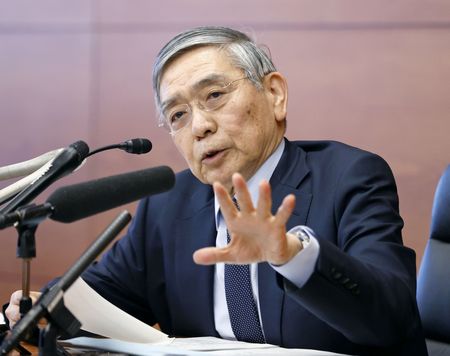 1
1 1
1

By Leika Kihara
TOKYO (Reuters) -Bank of Japan Governor Haruhiko Kuroda on Friday reiterated his view a weak yen benefits the economy as a whole, brushing aside concern the currency’s slide to multi-year lows could do more harm than good to the resource-poor, import-reliant country.
Due to structural changes in Japan’s economy, the benefit from a weak yen comes more through an increase in the value of profits companies earn overseas, rather than a rise in export volume, Kuroda said.
“There’s no change now to my view a weak yen is generally positive for Japan’s economy,” he told parliament.
The yen was headed for its worst week in two years, pummelled by Japan’s rising import costs and ultra-low low interest rates. It fell to a fresh multi-year low of 121.84 to the dollar on Friday.
Kuroda said the recent rise in import prices was driven mostly by global commodity inflation, rather than the weak yen.
While consumer prices may accelerate to around the BOJ’s 2% target from April, the central bank is in no rush to withdraw stimulus as any increase in inflation must be accompanied by steady rises in wages, jobs and corporate profits, Kuroda said.
“Cost-push inflation that is not accompanied by wage hikes will hurt Japan’s economy,” by weighing on households’ real income and profits of import-reliant firms, he said.
“As such, it won’t lead to sustained achievement of our price target. That’s why the BOJ will continue to maintain powerful monetary easing,” Kuroda said.
Speaking at the same parliament session, Finance Minister Shunichi Suzuki said the government will continue to keep a close eye on currency moves, including recent yen declines, and their impact on the economy.
“Exchange-rate stability is important, and sharp volatility is undesirable,” Suzuki said, repeating his verbal warning against excessive yen declines.
(Reporting by Leika Kihara; Editing by Jacqueline Wong & Shri Navaratnam)